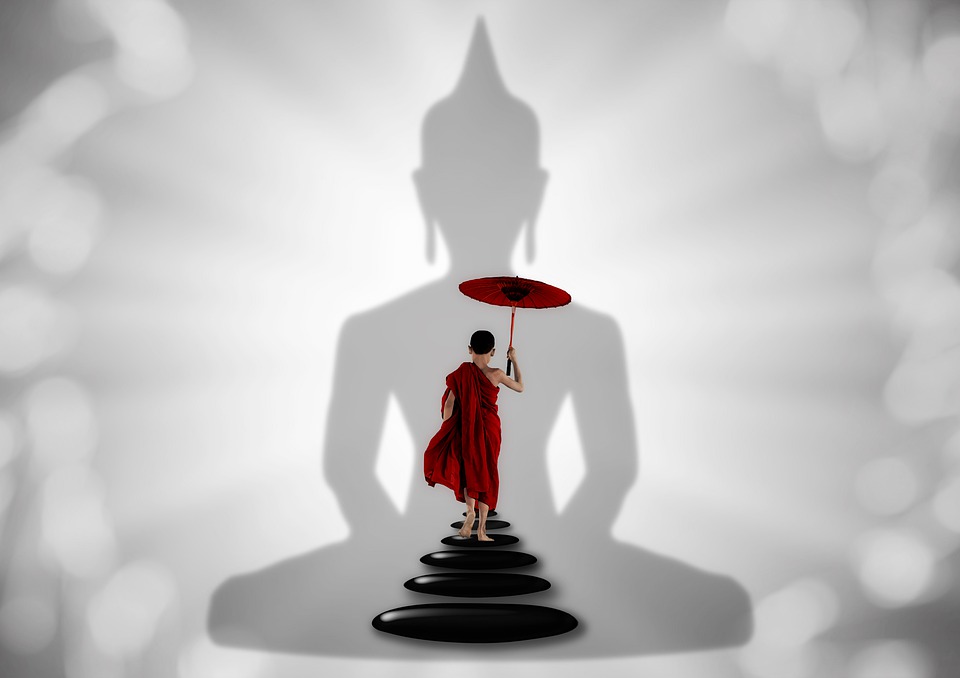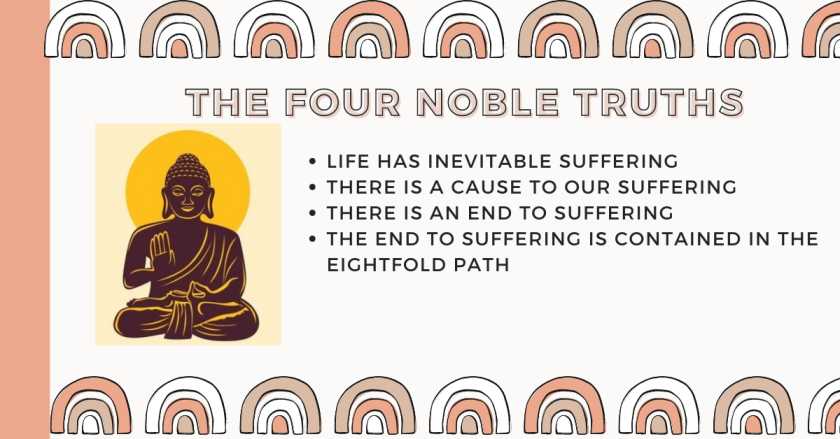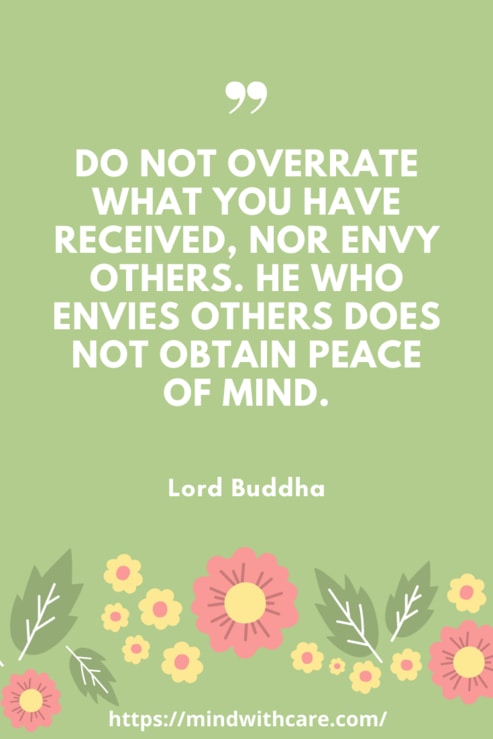In this article, we’ll explore Buddha’s teaching on life, It is a big topic, we’ll divide the teaching of Buddha into a few articles. In the first part, we’ll explore.
- The way of inquiry
- The four noble truth’s
There are four truths in this world: first, all living beings rise from ignorance; second, all objects of desire are impermanent, uncertain, and suffering; third, all existing things are also impermanent, uncertain, and suffering; fourth, there is nothing that can be called an “ego,” and there is no such thing as “mine” in all the world.

Having realized the goal of Perfect Enlightenment, the Buddha spent the next 45 years teaching a Path which, when diligently followed, will take anyone regardless of race, class, or gender to that same Perfect Enlightenment.
The Teachings about this Part are called the Dhamma, literally meaning “the nature of all things” or “the truth underlying existence”.
Table of Contents
The Buddha Teachings : The way of inquiry
The Buddha warned strongly against blind faith and encouraged the way of truthful inquiry. In one of His best know sermons the Kalama Sutta, the Buddha pointed out the danger in fashioning one’s beliefs merely on the following grounds: on hearsay, on tradition, because many others say it is so, on the authority of ancient scriptures, on the word of a supernatural being, or out of trust in one’s teachers, elders, or priests. Instead one maintains an open mind and thoroughly investigates one’s own experience of life.

When one sees for oneself that a particular view agrees with both experience and reason, and leads to the happiness of one and all, then one should accept that view and live up to it!
This principle, of course, applies to the Buddha Teaching. They should be considered and inquired into using the clarity of mind born of meditation.
Only when one sees these Teachings for oneself in the experience of insight, do these Teachings become one’s Truth and give blissful liberation.
The traveler on the way of inquiry needs the practice of tolerance.
Further along, the journey, what one once disagreed with might later be seen to be true.
So in the spirit of tolerant inquiry, here are some more of the basic Teachings as the Buddha gave them.
Buddha Teachings: The Four noble truths
The main Teaching of the Buddha focuses not on philosophical speculations about a creator God or the origin of the universe, or on a heaven world ever after. The Teaching instead is centered on the down-to-earth reality of human suffering and the urgent need to find lasting relief from all forms of discontent.
The Buddha gave the simile of a man shot by a poison-tipped arrow who, before he would call a doctor to treat him, demanded to know first who shot the arrow and where the arrow was made and of what and by whom and when and where….this foolish man would surely die before his questions could be well answered. In the same way, the Buddha said, the urgent need of our existence is to find lasting relief from recurrent suffering, which robs us of happiness and leaves us in strife.

Philosophical speculations are of secondary importance and, anyway, they are best left until after one has well trained the mind in meditation to the stage where one has the ability to examine the matter clearly and find the Truth for oneself.
Thus, the central Teaching of the Buddha, around which all other teachings revolver, is the Four Noble Truths:
That all from of being, human and otherwise, are afflicted with suffering. That the cause of this suffering is Craving, born of the illusion of a soul. That this suffering has a lasting end in the Experience of Enlightenment (Nibbana) which is the complete letting go of the illusion of soul and all consequent desire and aversion.
That this peaceful and blissful Enlightenment is achieved through gradual training, a Path that is called the Middle Way or the Eightfold Path.
It would be mistaken to label this Teaching as “pessimistic” on the grounds that it beings by centering on suffering Rather, Buddhism is “realistic” in that it unflinchingly faces up to the truth of life’s many sufferings and final end of the problem of suffering – Nibbana, Enlightenment in this very life!
Those who have achieved this ultimate peace are the inspiring examples who demonstrate once and for all that Buddhism is far from pessimistic, but it is a Path to True Happiness.
Buddha teachings quotes
Here we listed some of Buddha’s teachings quotes.
A fool who thinks that he is a fool is for that very reason a wise man. The fool who thinks that he is wise is called a fool indeed.
Though he should conquer a thousand men in the battlefield a thousand times, yet he, indeed, who would conquer himself is the noblest victor.
- Though he should live a hundred years, not seeing the Truth Sublime; yet better, indeed, is the single day’s life of one who sees the truth Sublime.
- Not to do any evil, To cultivate good, To purify one’s mind, – This is the advice of the Buddhas.
- To enjoy good health, to bring true happiness to one’s family, to bring peace to all, one must first discipline and control one’s own mind. If a man can control his mind he can find the way to Enlightenment, and all wisdom and virtue will naturally come to him.
- Those who are free of resentful thoughts surely find peace.
- Peace comes from within. Do not seek it without.
- One moment can change a day, one day can change a life, and one life can change the world.
- Everything that has a beginning has an ending. Make your peace with that and all will be well.
- No one saves us but ourselves. No one can and no one may. We ourselves must walk the path.
- It is a man’s own mind, not his enemy or foe, that lures him to evil ways.
- A man should first direct himself in the way he should go. Only then should he instruct others.
- There are only two mistakes one can make along the road to truth; not going all the way, and not starting.
- We are what we think. With our thoughts, we make our world.
- Your worst enemy cannot harm you as much as your own thoughts, unguarded. But once mastered, no one can help you as much. Not even your father or your mother.
- Meditation brings wisdom; lack of mediation leaves ignorance. Know well what leads you forward and what holds you back, and choose the path that leads to wisdom.
- We are formed and molded by our thoughts. Those whose minds are shaped by selfless thoughts give joy when they speak or act. Joy follows them like a shadow that never leaves them.
- To forgive others is to be good to yourself. The conquest of oneself is better than the conquest of all others.
- Let yourself be open and life will be easier. A spoon of salt in a glass of water makes the water undrinkable. A spoon of salt in a lake is almost unnoticed.
- Be a lamp unto yourself.



His Holiness Dalai Lama teaching on the Fourth Noble Truths
On the first day of His Holiness, the Dalai Lama’s three-day teaching on the Four Noble Truths was given in New Delhi, India, on March 23-25, 2012.
Related Articles
